 SENSE invited me to test the new PerfectIt proofreading add-on to Microsoft Word developed by SENSE member Daniel Heuman. I had tested an earlier version, but at the time thought my own eagle eye was virtually as good as PerfectIt’s algorithms. After hearing from colleagues who used PerfectIt to check their edited documents, I wondered if I had judged too quickly. I tested the beta version of PerfectIt Cloud, which was released on 26 June.
SENSE invited me to test the new PerfectIt proofreading add-on to Microsoft Word developed by SENSE member Daniel Heuman. I had tested an earlier version, but at the time thought my own eagle eye was virtually as good as PerfectIt’s algorithms. After hearing from colleagues who used PerfectIt to check their edited documents, I wondered if I had judged too quickly. I tested the beta version of PerfectIt Cloud, which was released on 26 June.
I played with the features and functions during my normal course of work for about two weeks. The comments below are based mainly on three representative documents: a 10,000-word article, a 46,000-word manuscript and a 124,000-word dissertation.
All in all, I was impressed with PerfectIt’s many useful functions. It is particularly good at pinpointing inconsistent hyphenation. Running it takes time, however. I could get up and pour myself a cup of coffee while PerfectIt analysed my longest documents (though this may be due to my less than stellar internet). All that waiting can seem like a waste of time when most of the items identified are not actually mistakes.
Cloud subscription
This latest version of PerfectIt has moved to the cloud. That means it needs an active internet connection to work, even after installation. I regularly use my laptop in internet-challenged corners of my home and garden, and I quickly learnt that without steady WiFi, PerfectIt simply won’t launch. However, it still does its job at low internet speeds. The developer has said that it's the upload speed that counts and mine registers at just 1 Mbps. So that may be something to consider. The move to the cloud also means that instead of purchasing the software, you now purchase a subscription.
Cloud subscriptions are obviously the future. It makes me question consumer power, since the long-term costs will almost certainly be higher for a subscription service than for a one-time licence. (It's worth noting that SENSE members receive a 30% discount on PerfectIt. See below for more details.) Moreover, I already have too many passwords and need to log in to too many places. Having said that, PerfectIt does log in automatically almost every time you launch it.
Interface
The interface is simple. Once you get familiar with it, navigating changes becomes a cinch. As the navigation pane contains a lot of information, more than a third of the screen is needed for good readability. A wide or double monitor is therefore advisable.
After the automatic login, PerfectIt prompts you to select what you want to do. You can choose from ten pre-loaded style sheets, four of which are spelling preferences (Australian, Canadian, UK and US). Three are international organization styles: UN, WHO and EU. There is also ‘American legal style’, ‘Australian government style’ and simply ‘check consistency’.
The developer has said that in the near future, you will be able to define your own style sheets, for example, Oxford style with UK conventions but ‘z’ spellings in words like ‘organization’.
Document analysis and tests
Once you click ‘start’, PerfectIt analyses the document. This takes some time, at least on my set-up. With the UK spelling style sheet, it took 1½ minutes to analyse the 10,000-word article. Longer documents took more time: 3½ minutes for the 46,000-word manuscript and 8 minutes for the 124,000-word dissertation. On the longest document, there was also a bit of a lag between mouse click and action. This may be due to my modest internet speed, but even so, it is something to keep in mind.
PerfectIt then initiates a series of tests. First it looks for inconsistently hyphenated phrases. In my test documents, these were virtually always – thankfully – correctly inconsistent. The add-on cannot distinguish between a compound used as an adjective (thus hyphenated) and a noun (thus not hyphenated). That said, I had not been 100% consistent everywhere, particularly in my longest documents, which shows that this could be a useful check of your own (or someone else’s) accuracy. In this sense, it could be a tool for improving your work – but you have to be savvy enough to know which of the flagged items are actually incorrect. The better your editing, the lower that percentage will be.
After going through phrases, PerfectIt checks word hyphenation. Inconsistencies found here included abovementioned versus above-mentioned, backup versus back-up and policy-making versus policymaking. In my documents, especially the very long ones, this almost always turned up a scattering of errors.
Spelling variations
I was particularly interested in the spelling variations test, though it is unclear to me what dictionary PerfectIt uses for its UK spelling. I am assuming Collins, since it does not recognize ‘z’ forms as correct UK style. Here it turned up usual suspects, like advisor instead of adviser, benefitting instead of benefiting, oriented instead of orientated and sizable instead of sizeable. This revealed my US editing slant, providing valuable information for me to improve my work.
Capitalization
The capitalization check turned up mainly false positives on my test documents. For example, authors’ names that are also a word in themselves (like Violet Weld). Also, proper nouns in a heading are flagged as possible errors when the heading style is lower case. On my test documents this turned up a whole sequence of false positives, which had to be manually accepted. Skipping such false positives can be a chore, especially in long documents. This is where it would be useful to learn your way around the interface, as you can skip any of the tests you choose.
Other checks
PerfectIt also checks a range of other potential problem areas such as en dashes vs. hyphens, accents, common typos, italics, abbreviations, open brackets and quotes left open (though interestingly, it did not find a paragraph with a close quote and no matching open quote). There are also tests for consistency in superscripts and subscripts, bullet punctuation, list punctuation, punctuation in tables, capitals in tables and table/box/figure order. Removal of extra spaces is the final task, though this did not work on many of my documents, returning an error instead. Perhaps this is a beta version issue.
There are two intriguing ‘finalization tasks’: ‘table of abbreviations’ and ‘text in comments’. The former is very useful, as it generates a list of abbreviations from the document with their meaning written out in full (where available). The latter generates a list of all the comments in the document. This was a bit of a disappointment because I had hoped it would check spelling and language consistency in the comments. Moreover, it returned an error on some of my documents. Hopefully this is a beta version issue.
Useful and informative
In sum, Heuman has to be applauded for producing a useful and informative product. Still, I won’t be bringing in my editor’s shingle quite yet. PerfectIt’s pinpointing of possible errors actually requires users to sharpen their editorial wits. And while I do use the cloud, I tend to avoid software that requires an internet connection to work – I’d prefer that it work off as well as on the grid. I've since learnt that an annual subscription for the cloud version will include access to the latest offline version. Finally, privacy and security are aspects to consider. Although the developers say all texts are encrypted and stored on a secure server and deleted shortly after you’re done, I would not feel comfortable running PerfectIt on a document marked confidential.
 Michelle Luijben edits and enjoys the outdoor life in Exloo, the Netherlands.
Michelle Luijben edits and enjoys the outdoor life in Exloo, the Netherlands.
SENSE members get a 30% discount on PerfectIt. See the SENSE site for information on how to claim your discount.
Write a blog post about the new EU payment service directive and make it entertaining, said my client. Before I could even think about the entertaining bit, I spent hours trawling through articles that all said such different things about the directive that I ended up reading the bloomin’ thing itself, or at least parts of it. If only I’d attended Stephen Johnston’s workshop ‘The impossible blog: how to write a readable blog from unreadable material’ beforehand. It was held in Den Bosch on 8 June, the day before the SENSE 2018 conference.
Make the complicated sound simple
So how do you write a readable blog about a less than thrilling topic? Well, said Stephen, it’s about the tone. That's what makes a blog a blog. Write as though you’re talking to someone, but without the ums and ers. Avoid jargon, and if you must use it, explain it. Make the complicated sound simple. Avoid words you wouldn’t use in regular speech.
Know your reader
It’s also important, said Stephen, to know who your reader is and why you’re writing for them. What do you (or your client) want the reader to do when they have read the blog? Buy your product? Find out more about your company? Contact you? Keep this in mind while researching and writing the blog.
This brought us on to the structure. Stephen had brought along some materials about a new product, ranging from a very technical proof of concept document to marketing slides. Our job was to scan the material and find three main messages, without forgetting the reader and aim of the blog. He explained that once you have these three messages you can present these together followed by the supporting material. Or you can present them as: main message, supporting material, main message, supporting material and so on.
How to start and finish
We also looked at what to say in the introduction, which is where you explain why you’re writing the blog. Then Stephen talked about ending with a ‘call to action’. This is what you want the reader to do when they finish the blog. Stephen also talked about using headings to make the post easier to scan.
A blog about writing blogs. How meta! So – I began the piece by explaining what it’s about, am writing as I talk, have made the subject matter sound simple and have three main messages followed by supporting material. All that's left now is the call to action. What do I want you the reader to do? Why not improve your blog writing skills by writing for the SENSE blog? We're always looking for new input and it's a great way to spread the word about your business. Contact me if you're interested. For upcoming workshops see the SENSE events page.
 Marianne Orchard is on the SENSE Executive Committee and an editor and writer for the SENSE blog and newsletter. She is a freelance translator (Dutch to English), editor and writer who specializes in creative texts.
Marianne Orchard is on the SENSE Executive Committee and an editor and writer for the SENSE blog and newsletter. She is a freelance translator (Dutch to English), editor and writer who specializes in creative texts.
Several SENSE members are speaking at the SENSE 2018 Conference. Here they reveal what they hope to achieve and what they are looking forward to at the conference.
Editing English-language doctoral theses in the Netherlands: are the SENSE Guidelines useful?
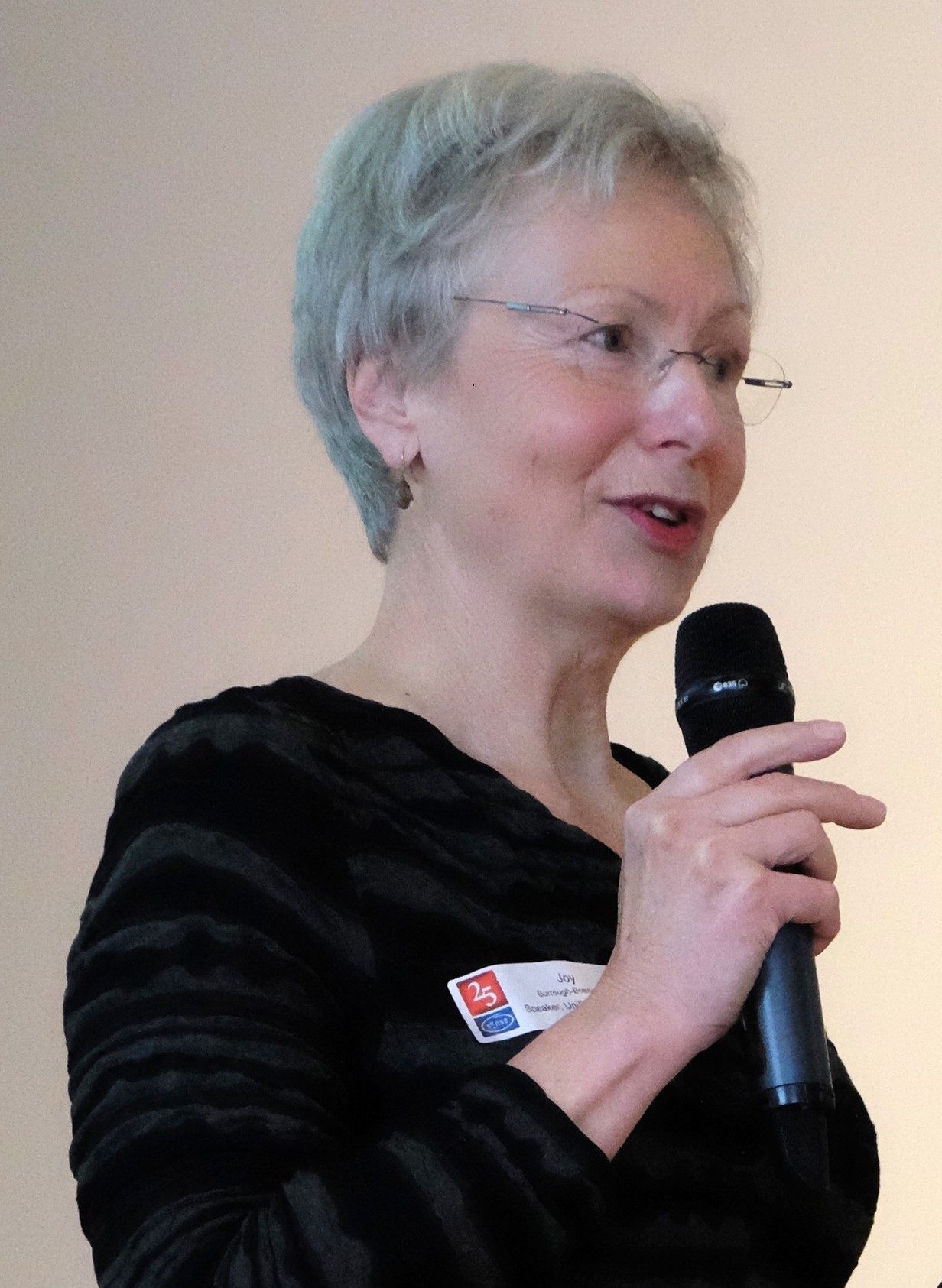 Joy Burrough-Boenisch: ‘In my presentation I dig deeper into the situation that contributed to SENSE setting up the Guidelines for Proofreading Student Texts to explore why – unlike universities in anglophone countries such as the UK and Australia – Dutch universities seem unconcerned about the ethics of editing PhD work.
Joy Burrough-Boenisch: ‘In my presentation I dig deeper into the situation that contributed to SENSE setting up the Guidelines for Proofreading Student Texts to explore why – unlike universities in anglophone countries such as the UK and Australia – Dutch universities seem unconcerned about the ethics of editing PhD work.
'I’ll suggest how we editors can respond. I secretly hope that awareness of the issues raised in this presentation will ripple out beyond SENSE and create waves in Dutch academia that will ultimately result in acknowledgement of the need for guidelines and transparency about the editing of student texts in the Netherlands.
‘I’m particularly looking forward to hearing Nigel Harwood’s presentation at the conference, as he’s done thorough empirical research on what “proofreaders” in the UK do to a student text and why. His findings will help us put our own work and approach here in the Netherlands into context.’
 Dealing with Dunglish – and other source-language interference
Dealing with Dunglish – and other source-language interference
Lloyd Bingham: ‘I’m delighted to be attending a SENSE conference for the first time, more so because of this year’s theme: Englishes now! As translators into English, we need to be conscious of the varieties of English that our target audiences speak and we need to write accordingly.
‘My presentation will examine the hybrid language that is Dunglish and the problems it poses for translators. Dunglish is traditionally understood to mean English words borrowed by Dutch that retain the same meaning. Modern Dunglish, however, is also about borrowing words and phrases that might look English and sound English…but English they ain’t. Cue translators pulling their hair out, trying to get to the bottom of what a Dunglish phrase actually means. After all, there are no Dunglish dictionaries! So my presentation will propose some techniques to translate Dunglish into English that natives can understand.
‘Looking forward to seeing you there!'
 Disrupting the inheritance of poor writing habits: an alternative approach to editing and teaching writing (in the health-related sciences)
Disrupting the inheritance of poor writing habits: an alternative approach to editing and teaching writing (in the health-related sciences)
Charles Frink: ‘The main goal of my presentation is to provide a glimpse of the underlying scientific structure in biomedical manuscripts. A narrow linguistic approach to writing and editing is often ineffective if the core scientific elements of a biomedical manuscript are not explicitly present and logically linked. The document may still lack the elusive “flow” that is so highly prized by peer reviewers and journal editors.
'My proposition is that mastering this structure will empower young scientists to disrupt the inheritance of poor writing habits from their supervisors, professors and senior co-authors.
‘I am especially looking forward to Valerie Matarese's presentation on bad textual mentors and the panel discussion on language versus subject specialists in biomedical editing and translation.’

Marcel Lemmens: ‘Some literal translations are fine and others are awkward. The awkward ones are often examples of translatorese. Being able to distinguish between the two makes you a better and more efficient editor. That is the message we would like to get across.’
 Tony Parr: ‘Among the points we’ll be looking at are “the curse of knowledge” and “translator’s privilege”. So what have these got to do with translatorese and why should we as translators be wary of them? To find out, join us at 9.30 on Sunday morning on 10 June (gulp)!’
Tony Parr: ‘Among the points we’ll be looking at are “the curse of knowledge” and “translator’s privilege”. So what have these got to do with translatorese and why should we as translators be wary of them? To find out, join us at 9.30 on Sunday morning on 10 June (gulp)!’
 International science needs English editors
International science needs English editors
Jackie Senior: ‘I hope to show that it is well worth specializing in science editing if you’re looking for a niche. I’m particularly looking forward to meeting the international delegates at the conference and hoping they will set SENSE members thinking about the Dutch versus the European situation.’
 '... divided by a common language': cultural, topical and geographical Englishes
'... divided by a common language': cultural, topical and geographical Englishes
Nigel Saych: ‘I’m looking forward to discussing with people attending my presentation how the English we used in the past differs from that in use today, and what we may have to concern ourselves with as linguists in the future. My only regret is that I can’t attend the other sessions that are on at the same time!’
 Outreach and research communication in English: opportunities for language professionals
Outreach and research communication in English: opportunities for language professionals
Maria Sherwood-Smith: ‘What I would like to achieve with my presentation is to sound people out on what I think may be a trend towards a more central role for communication skills in the research process and what implications this may have for language professionals. And as a first-time presenter, I suppose my other aim is to take another step along the path towards becoming that mythical “language professional”, as opposed to merely the full-time language amateur I usually feel I am.
‘As for other presentations, I’m especially looking forward to Jeremy Gardner's talk on EU English, Nigel Harwood on editing Master’s theses and Jackie Senior on science editing. I am particularly sorry to be missing the panel discussion on the Dutch guidelines for editing PhD theses in an international context, which is at the same time as my own presentation. I found it very difficult in general to choose between all the tempting parallel sessions...’
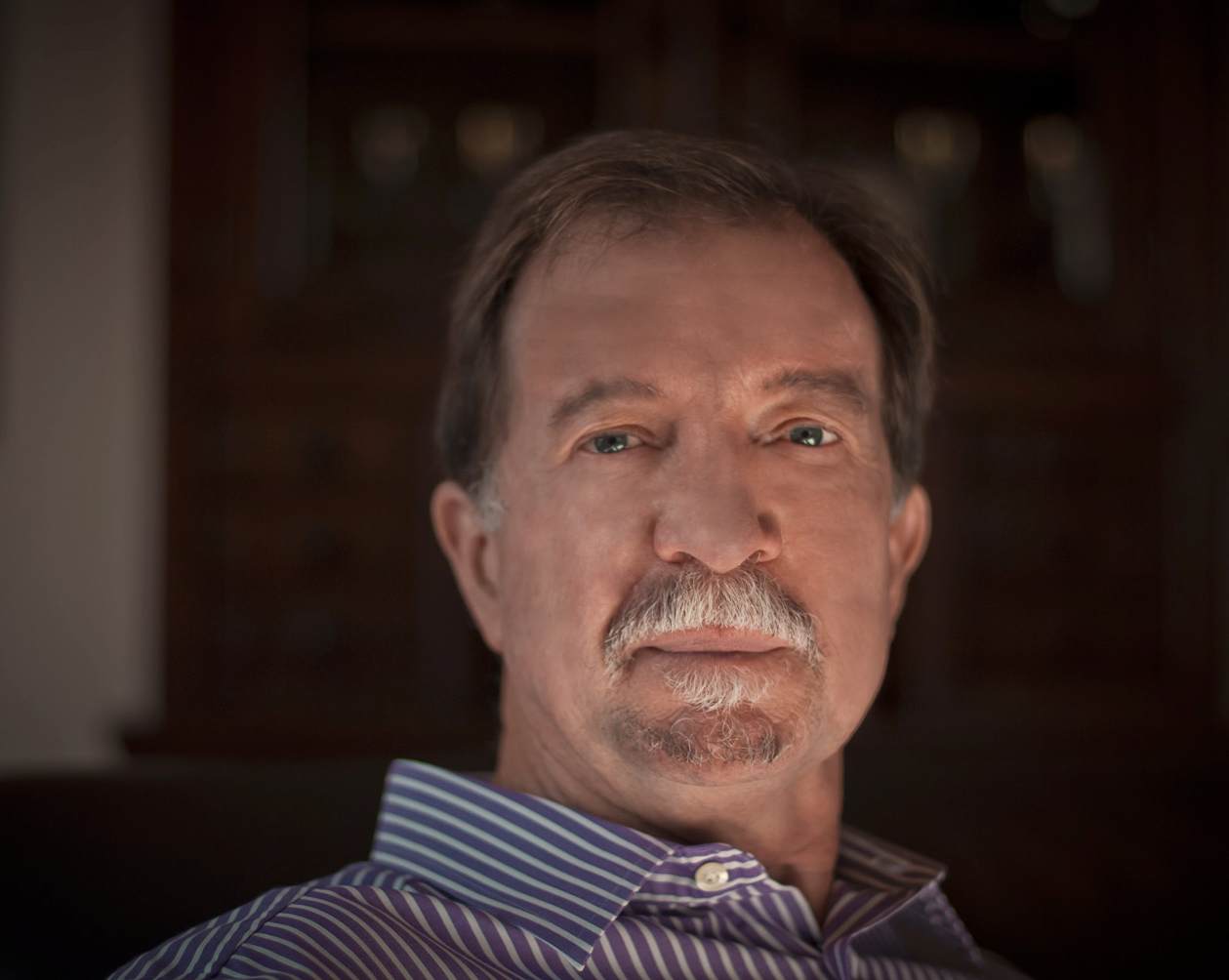
The day before the SENSE 2018 Conference, John Linnegar is giving a workshop entitled ‘It needs only a “light” edit': negotiating the differences between light, medium and heavy editing. We caught up with him to find out more.
How do you feel about giving a pre-conference workshop?
Very enthusiastic, for two reasons: first, I believe that such workshops (certainly most of those I’ve attended) offer great value to attendees – we always come away with worthwhile and practical knowledge and skills, even if they only refresh our current thinking and practice. Second, the topic I’ll be covering strikes many a chord among editors – many are searching for the answer to the question of how we distinguish between the different levels of editing. I myself learnt the answer relatively late in my career as an editor! Now I want to share my discovery with my colleagues, because I know how much it has helped me with editing and quoting.
What do you hope participants will take away from the workshop?
A clearer understanding of the differences between the three levels of editing (heavy, medium and light), and of the criteria used to distinguish one from the other. I’ve also developed a little ‘formula’ for measuring the differences, which I’ll be sharing with the participants.
Are you attending the conference itself?
Yes, and I’m looking forward to it! I’m on the organizing team, too. And besides the workshop, I’ll be presenting a brief session on Garner’s Modern English Usage (OUP 2016). I believe it to be a gem of a reference work for (English) language practitioners. It’s an admirably modern update to Fowler’s Modern English Usage, and displays wonderful inclusivity and balance in dealing with American and British English.
Is this the first SENSE conference you’ve attended?
No, I had the privilege and pleasure of attending the 2015 Jubilee Conference, shortly after I joined SENSE. That was a great professional gathering and information-sharing experience that I was concerned should not be allowed to remain a one-off. After all, other societies in Europe hold annual conferences...
What are you looking forward to most?
First, the two keynote speakers, speaking on topics of great interest to all of us. Then, the camaraderie engendered by a meeting of minds from all over Europe (11 countries). Recently, I’ve become particularly interested in how the quality of translations is evaluated, so I’m keen to hear what a researcher in the field – Dr Iris Schrijver, from the University of Antwerp – will have to say about this controversial topic.
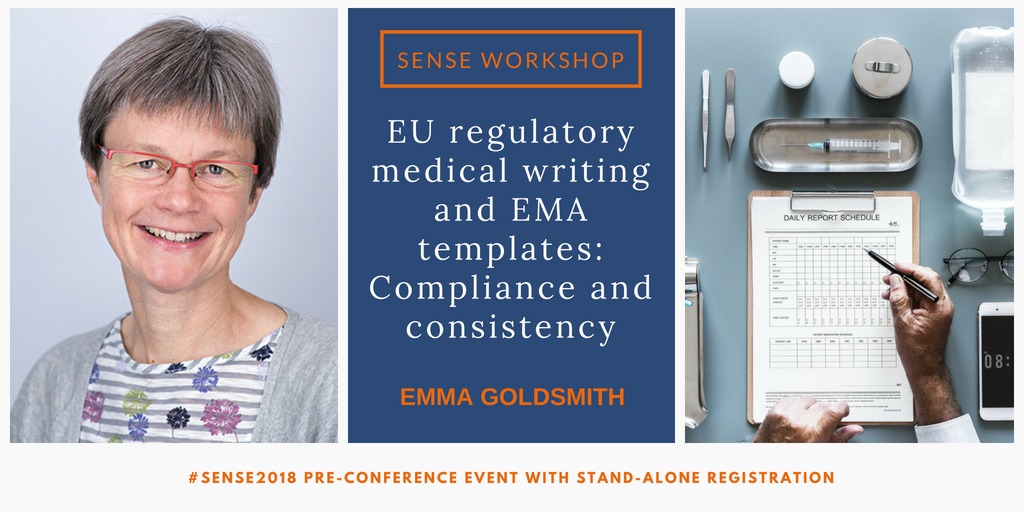
Emma Goldsmith is travelling from Spain to give a workshop entitled 'EU regulatory medical writing and EMA templates: compliance and consistency' the day before the SENSE 2018 Conference. We caught up with her to find out more
‘I’m the sort of person who loves to follow rules,’ says Emma. ‘Give me a style guide and I’ll read it from cover to cover. Give me a deadline and I won’t be late. That explains why I feel so at home with EMA templates and the strict terminology, quick turnaround times and detailed guidance documents that go with them.’
If, like Emma, you love rules and are a translator who works with European languages, then this workshop is for you. You will learn about, or refresh your knowledge of, EU regulatory medical writing in general and EMA (European Medicines Agency) templates in particular.
‘My goal is to share my enthusiasm for EMA templates with workshop attendees,’ says Emma.
Emma is a Spanish to English translator who specializes in medicine. She has over 20 years’ experience translating clinical trial documentation, articles for publication in medical journals, and product information for EMA submissions. She trained and worked as a nurse before becoming a translator.
The workshop is on Friday 8 June from 14.00 to 17.30, the day before the SENSE 2018 conference. It will take place at the conference venue, Hotel Central in the Dutch city of ’s-Hertogenbosch.
Emma is travelling from Spain to give the workshop. Will she be attending the conference while she’s there?
‘Absolutely,’ she says. ’I’m particularly looking forward to the contrasting talks on well and poorly-written texts by Charles Frink and Valerie Matarese. I’ve also got my eye on the Saturday morning guided tour of 's-Hertogenbosch and I’m only sorry that my early Ryanair flight on Sunday afternoon means that I’ll miss the boat trip!’
Is this her first SENSE conference?
‘This will be the first SENSE conference I’ve attended and in fact the first time I set foot in the Netherlands. So I’m looking forward to it for many different reasons: meeting old friends, making new ones and getting to know a new country, language and culture, albeit in just 72 hours!’
So if you fancy following some rules and want to learn all about the not-so-wild world of regulatory medical writing, sign up for the workshop. (Don’t forget to log in first if you’re a SENSE member).
 As a scientific language editor, I often need to browse articles when editing. But without a university/institute subscription, getting free access to the literature can be tricky.
As a scientific language editor, I often need to browse articles when editing. But without a university/institute subscription, getting free access to the literature can be tricky.
Although the number of open-access journals is increasing, many articles are still locked behind ‘paywalls’. This means that to read the full text of a particular article, you have to purchase it, or subscribe to the journal for a hefty fee. I doubt my clients will accept that add-on cost.
But free versions of paywalled articles are sometimes available, for example if the author has uploaded it elsewhere. Impactstory is a non-profit open-source, web-based service committed to making research data freely available to all. In April last year, they introduced Unpaywall, a web browser extension that can retrieve open-access articles immediately and automatically. For free.
Unpaywall can be installed into Google Chrome or Mozilla Firefox browsers. It takes seconds and you don’t even have to restart your computer. It works automatically, while you browse, so no need to insert the article’s DOI into a search box. And don’t worry: Unpaywall only retrieves articles from legal sources.
It’s pretty user friendly. A few seconds after finding an article, an Unpaywall symbol will appear at the side of your screen. If an open-access version of this article is available elsewhere, a green unlock symbol will appear. Clicking on this symbol allows you to read it for free. A grey lock symbol tells you that no open-access version was found. Unpaywall finds a free version at least 50% of the time, which makes life a little easier (and cheaper) for the self-employed language editor.

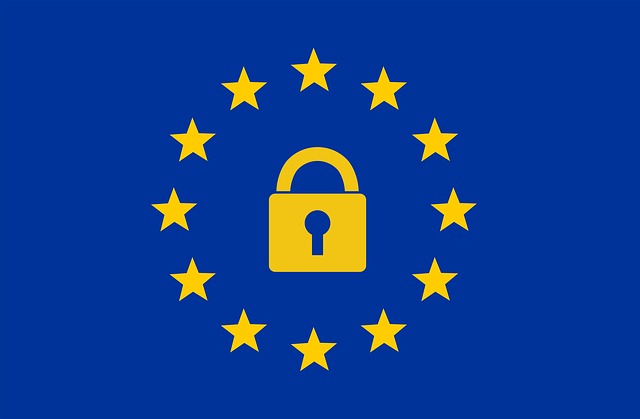 After seeing GDPR and AVG abbreviations popping up all over the place – in emails from Google, from the freelancers’ platform PZO, and on social media – and with 25 May fast approaching, and having missed SENSE’s January workshop on data privacy and information security, I thought I’d better take a look at what all the commotion was about. Read on to find out what I dug up and how it applies to freelancers.
After seeing GDPR and AVG abbreviations popping up all over the place – in emails from Google, from the freelancers’ platform PZO, and on social media – and with 25 May fast approaching, and having missed SENSE’s January workshop on data privacy and information security, I thought I’d better take a look at what all the commotion was about. Read on to find out what I dug up and how it applies to freelancers.
What is the GDPR?
The General Data Protection Regulation – or Algemene verordening gegevensbescherming (AVG) as it’s known here in the Netherlands – will soon come into force across the EU. It’s basically a privacy law that tightens up the rules on providing third parties with our data, so that we know what will be done with it and why before we give our willing consent. The new laws are relevant to both our professional and personal lives, as Marianne Orchard indicates in her review of John Yonce’s data privacy workshop: ‘professional because we must protect any personal data of others that we have access to and personal because we should protect our own data.’
For a perfect example of why such a regulation is needed, we need look no further than the Facebook–Cambridge Analytica data scandal, in which the data of millions of Facebook users was handed over to a political consulting firm without those users’ knowledge or permission.
Of course, it’s easy to say, ‘Well what do you expect if you’re on Facebook?’ But even if you’re aware of their business model – ie, that the advertisers are the real clients and you are just the product – most Facebook users, myself included, have not been persuaded to delete their accounts. Naive it may be, but we assume that companies use our data respectfully and comply with what regulations are in place, for the simple reason that we can no longer do without the plethora of apps and websites at our fingertips.
After all, how else do we keep up with friends and families in other countries and with our kids’ online activities, not to mention our professional networks? How else do we comply with requests for information from our clients, agencies and business contacts? Whether moving house, writing a will, buying insurance, joining a professional association, enrolling at a new translation agency or using our clients’ complicated billing systems, we are continuously filling in our personal data online.
When will it be enforced and to whom does it apply?
The GDPR comes into effect on 25 May 2018 throughout the EU, from which point any large companies found to be in breach can expect large fines. Great news for consumers as it means greater protection of our personal data, including sensitive information such as religion, racial or ethnic origin, political opinions, religious or philosophical beliefs, trade union membership, genetic data, biometric data, data concerning health or data concerning a natural person’s sexual life or sexual orientation.
According to this website for small businesses, the GDPR applies to any business that processes the personal data of EU citizens. This includes customer, supplier, partner and employee personal data. In addition, companies processing data that have more than 250 employees, or for whom processing data is a core activity, must appoint a Data Protection Officer or DPO – someone up to date on data protection practices and the legal framework and who is responsible for ensuring that unambiguous consent is obtained from ‘data subjects’, i.e. EU consumers and citizens.
What do freelancers need to do about it?
Naturally, freelancers are way below the threshold of 250 employees. And another nugget of information I found on this website for startups is the following: ‘The Regulation only applies to personal data if it is processed wholly or partly by automated means or is part of a sophisticated hard copy filing system.’ Aha! – nothing to do with me as I’m not processing data.
But does this mean that I can ignore it entirely? I’m still in two minds. My gut feeling and pure logic says no: I have no automated mailing list for sending round emails to clients or business contacts. I have no form on my website for people to get in touch. The only personal data I have of clients that is not already publicly available is the data the tax office requires that I put on my invoices. Some clients ask me to address the invoice to their private address, and some clients’ business and home addresses are the same. Colleagues to whom I sometimes outsource work also give me personal data in their emails and invoices. But who is going to be bothered about me having that data on my computer? Surely I can’t run my business without it?
But on the other hand, regardless of whether or not the risk of a fine is minuscule, it’s no bad thing to think about what data on other people I have on my computer and how it is protected, right? I found more information on how freelancers can prepare for the GDPR on this website of a collective of freelancers in healthcare communications.
Is there anything in particular that editors, translators or copywriters should consider?
When I put this question to the SENSE members forum, several people confirmed my initial gut feeling that this does not apply to freelancers. But others are not so sure. What about personal information in medical, legal or HR-related files that we edit or translate? From my days as a medical translator I remember one particular agency that rarely took the trouble to remove personal information from the texts they sent me, which was clearly in breach of privacy legislation.
In this respect, it seems I need a privacy notice, available on demand or downloadable from my website. This is a public statement of how a company – whatever its size – applies data protection principles to processing data. And I assume this applies to personal data that clients and colleagues provide me by email. The privacy notice tells them what I’m going to do with any information they provide. Fair enough.
Fellow SENSE member and translator Robert Bradley recently had a privacy statement drawn up. He says:
To me, it's worth it, and I suspect it might be for quite a lot of translators: not so much because people might start demanding to see what data we have on file, but because we have clients who are subject to the stricter rules and who need to demonstrate compliance. That means that they need confirmation from their suppliers (that's you and me) that everything's sorted out. I'd rather not lose any clients over this.
Meanwhile, over on good old Facebook, a translator based in the Czech Repubic (or Czechia if you prefer) has set up a group called GDPR for Translators (you’ll need to log in first) which has plenty of discussions on the topic, plus resources and tips for both agencies and translators who want to make sure they are GDPR-compliant. There are questions and answers on topics such as deleting old emails and email addresses, cloud storage, websites and privacy statements.
So what is SENSE doing about the GDPR?

Clearly, SENSE as an organization also needs to be on the case with regard to the personal data it collects from members. But more about this in a follow-up post!
Feel free to post your comments below or get in touch to share your experiences with the GDPR.
Sally Hill is an editor and writer for the SENSE blog and newsletter and a British biologist-turned-linguist who runs a business called Scientific Texts.
 Sometimes you come home from a workshop thinking how useful it was and how you’ll definitely do everything the trainer suggested… when you find the time.
Sometimes you come home from a workshop thinking how useful it was and how you’ll definitely do everything the trainer suggested… when you find the time.
Sometimes you dash straight to your PC.
The latter was certainly the case after John Yonce’s immensely useful Data Privacy and Information Security workshop. By the time the kids had surfaced on Sunday morning, I’d installed two new browsers, tried out a new non-spying search engine, looked at what my virus scanner did on the malware front, installed an ad blocker, reviewed my backup process and configured the password vault I’d recently started using. (And made a checklist of all of this and checked off each item as I completed it.)
Most of us at the workshop were attending because we’d heard about the EU’s new General Data Protection Regulation (GDPR) and this seemed like an easy way to find out what we needed to do. We were working as translators, copywriters, editors, subtitlers and interpreters.
John began by looking at the origins of privacy and how it has a cultural context: in some cultures you don’t talk about your salary, for instance, whereas in others it’s fine. The modern concept of privacy dates to 1890 Supreme Court Justice Louis Brandeis and Samuel D. Warren talking about ‘the right to be let alone.’
We then looked at current privacy laws in the Netherlands and Europe and the GDPR in particular. This was relevant to our professional and personal lives: professional because we must protect any personal data of others that we have access to and personal because we should protect our own data.
The next step was to look at possible threats to privacy and information, and measures to prevent these. This means virus scanners, firewalls, ad blockers, malware blockers, updates and so on.
It also means general awareness of what data you’re sharing with whom when you install an app, create an account or hand over a copy of your passport, and whether you want to share this data at all. And a whole lot more, because there’s a lot of bad eggs out there waiting to get their hands on your data.
SENSE workshops tend to be bastions of niceness with lots of tip sharing and empathising. This stood out against the skulduggery and menace of data theft. But perhaps skuldugs are also charming to each other at skulduggery workshops and travel home together on the train discussing words for sprinkles (chocolate vermicelli, nonpareil, hundreds and thousands…), why coriander is cilantro in US English and how they need crocheted bootees for their sofa legs because they keep stubbing their toes on them. Who knows?
 Marianne Orchard is on the SENSE Executive Committee and an editor and writer for the SENSE blog and newsletter. She is a freelance translator (Dutch to English), editor and writer who specializes in creative texts.
Marianne Orchard is on the SENSE Executive Committee and an editor and writer for the SENSE blog and newsletter. She is a freelance translator (Dutch to English), editor and writer who specializes in creative texts.
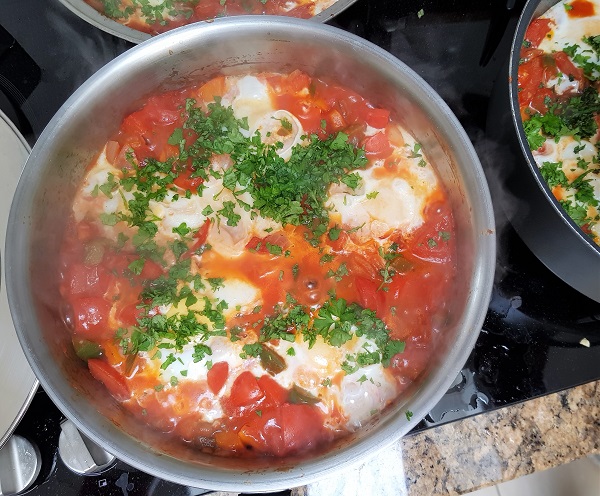 At the recent AGM, SENSE's Executive Committee (EC) installed three new members, myself included. For our first meeting in mid-April, we got together for a 'team building and website training day.' For me, the standout moment of the day was an animated discussion on how to chop a pepper. It embodied what teamwork is and illustrated why the EC needs to work as a team and how this will benefit SENSE and its members,
At the recent AGM, SENSE's Executive Committee (EC) installed three new members, myself included. For our first meeting in mid-April, we got together for a 'team building and website training day.' For me, the standout moment of the day was an animated discussion on how to chop a pepper. It embodied what teamwork is and illustrated why the EC needs to work as a team and how this will benefit SENSE and its members,
I'm sceptical of 'team building.' Maybe it's because my husband has herded sheep and spent hours communing with horizontal rain on Solex tours (yes, more than one) of the polder in the name of team building.
Sheep and Solexes were unlikely, but would we have to do trust exercises?
Luckily not. After learning how to hoist the SENSE flag for events (no, SENSE didn’t become a paramilitary organization when the SENSE constitution was amended last year), a round of ‘tell us a bit about yourself’ and some strategy brainstorming, it was time for the team-building proper to begin. Time to start doing rather than talking.
Jenny, our acting chair, had chosen the benign ‘make lunch together’ as the activity.
Before we could make our lunch – a dish called Shakshuka – we needed to do the shopping. While three of us headed off to the Albert Heijn at the end of the road, the others started chopping onions, in anticipation of the arrival of the other ingredients.
Yay, we’d allocated tasks. We were working as a team already!
But niggles emerge when you work with others. Wasn’t that too much oil in the pan? Wasn’t the flame too high? Wouldn’t it be better to crack the eggs into bowls first?
As mother of a teen and a tween, I’m learning it’s often best to keep your big mouth shut. Or in the words of the great oracle Ronan Keating, ‘You say it best when you say nothing at all.’ I’d assumed this worked best for teams too. Just let people get on with their oil-dispensing, onion-chopping, egg-cracking madness. Things should work out in the end.
But that was before the pepper discussion. The pepper revelation. As two of the EC chopped peppers they noticed they were using different pepper-chopping strategies! And started discussing them. And wondering if the other strategy might work better.
This is what teamwork is. It’s alright to comment on how people do things. But you have to pitch it right. And if you’re on the receiving end you need to be open to doing things differently.
Will the pepper revelation be emblematic of this EC? Will we be the Order of the Capsicum?
Will we discuss how to do our tasks? Will we offer and be open to suggestions? Let’s hope that this constructive and gezellige day bodes well for the future.
Marianne Orchard is on the SENSE EC and writes and edits the SENSE blog and newsletter. She is a freelance translator (Dutch to English), editor and writer who specializes in creative texts.
The SENSE 2018 Conference is approaching fast and you may be curious about what's going to be on offer. We therefore caught up with Stephen Johnston, who is giving the pre-conference workshop entitled 'The impossible blog: How to write a readable blog from unreadable material.' It’s all about the hook, he says.

Ever been asked to write an entertaining piece about EU legislation, a new pension plan or the latest innovation in grout? Then this workshop is for you.
Or perhaps you just want to learn how to turn drab into fab, sigh into wry, yawn into… prawn?
‘It’s all about looking at the source material and finding an interesting hook,’ says Stephen. ‘This will most likely end up being the title, intended to catch the reader’s eye. The hook then informs the rest of the blog.’
And what will participants take away from the workshop?
‘The ability to turn dry, overly-granular information into an interesting, easy-to-read blog,’ he says.
Stephen is a professional trainer, copywriter and journalist who works with multinational companies on projects such as websites, internal and external communication, white papers, marketing material, brochures, corporate journalism, speechwriting... and blogs.
The blog workshop is one of four pre-conference workshops. How does Stephen feel about giving the workshop?
‘Delighted. It will be a great way to warm up to the event with a fun, interactive (and hopefully skill-delivering) few hours.’
And is he attending the conference itself?
‘Yes! I have attended a lot of SENSE events, but this will be my first conference. I’m looking forward to the mix of speakers and the opportunity to catch up with colleagues.’
The SENSE 2018 conference is on Saturday 9 and Sunday 10 June. But there’s also a range of pre-conference workshops and sightseeing activities. So even if you can’t make it to the conference itself, you can still join in.
The workshops will be held on Friday 8 June from 14:00 to 17:30 at Hotel Central in ’s-Hertogenbosch, the conference hotel. They are open to SENSE members and non-members alike. Various fees apply.
So if you want to find out why hooks are as important to writers as they are to shepherds or pirates, go to the registration page and sign up for Stephen’s workshop. (Don't forget to login first if you're a SENSE member.) But hurry because places are limited!
